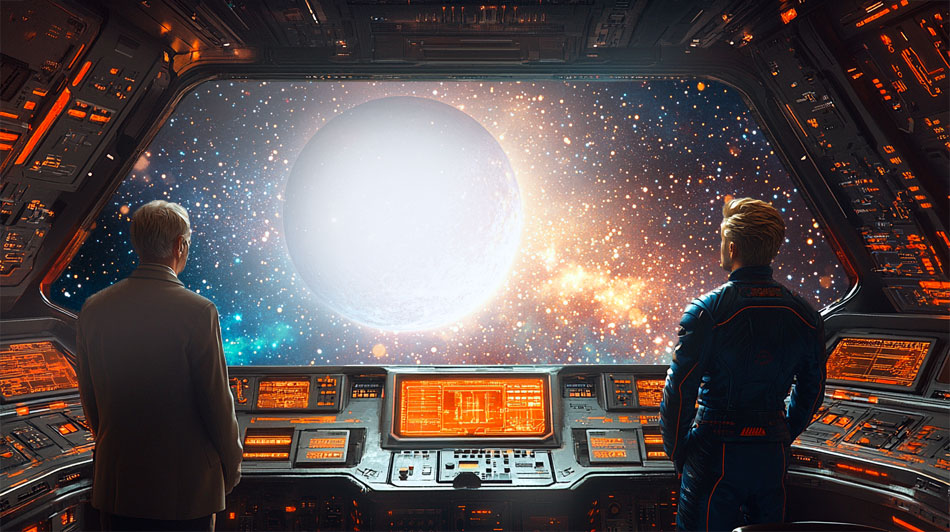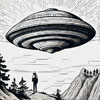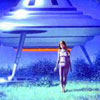Inside The Spaceships: My First Look At Outer Space
 by George Adamski
by George Adamski
At this point, a man who appeared to be about my age entered from a door in the left corner of the room, smiling in a friendly way. Although I had noticed a ladder in that corner which I presumed must lead to an upper deck of the ship, I had seen no door until he entered through it.
Upon his appearance the two girls excused themselves and left through the doorway leading into the control room. Shortly, Ilmuth, the Martian, returned. She had changed from her lovely gown to a pilot’s suit of the same style as that worn by the men. The color was light tan with bands of darker brown at the top and bottom of the waist belt. I was delighted when she asked if I would like to accompany her to the pilot’s compartment.
Firkon joined us and as we three climbed the ladder to the next deck, I noticed Orthon leave through the control room where we had first entered after landing on the mother ship. The elder man and Ramu, the Saturnian, remained in the lounge.
As we walked along the upper deck corridor, Firkon said, “Each of these large ships carries many pilots, who work in shifts of four, two men and two women. Kalna and Ilmuth are pilots on this Venusian ship.”
The corridor, like all parts of the craft I had seen was pleasantly lit from some invisible source, and led upward and forward into a small room at the end of the large ship.
As we entered this room, a young man who was bent over a chart of some sort looked up, nodded and smiled, but no introductions were made. I presumed he must be Ilmuth’s pilot companion.
“This seems a good moment,” said Firkon, “to explain a little more about this ship. It is a carrier for twelve Scouts such as the one in which we arrived. Actually, the interior is not nearly as large as one would guess from its outward size. This is due to much of our mechanical devices being installed between walls.”
“This particular ship,” Ilmuth added, “has four walls or skins. Some have more and some less, depending on their size and the purpose for which they are built.”
As I looked at the number of strange instruments within this room, I was curious to know what “mechanical devices” lay between the walls. Firkon said, “I will explain as fully as possible in the few moments available. The entire section of the ship through which we first entered is given over to storage space for the Scouts, except for a large machine shop in which any necessary repairs can be made. In spite of the great skill and care that go into the original construction, parts do break and materials do wear. Much is required of any craft that travels space.
“The pressurizing equipment which maintains a comfortable temperature throughout the ship is installed between the walls, and much else which would require more time to explain than we have just now. Entrance doors leading into the various walls in all parts of the ship make access easy. Each craft carries several mechanics who, working in shifts, are on constant duty to inspect and check all parts. Therefore, it is seldom that any defect remains undiscovered to the point of giving real trouble.”
In this pilot room I could look up or out or down, in whatever direction I turned my head. As Firkon finished speaking, the young man reached out and touched a button. Immediately, further openings like portholes began to appear in what I had thought was solid wall. Then both pilots took their places in small seats on opposite sides of the room. I felt a slight movement and the ship seemed to nose upward.
My heart beat violently as I wondered if perhaps they planned to take me to their planet. The hope was short-lived. It seemed but a moment before the ship stopped and again hovered. Ilmuth smiled up at me and said, “We are now about fifty thousand miles from your Earth.”
Firkon motioned me to come to one of the portholes as he said, “Perhaps you would like to see what space really looks like.”
I soon forgot my disappointment as I looked out. I was amazed to see that the background of space is totally dark. Yet there were manifestations taking place all around us, as though billions upon billions of fireflies were flickering everywhere, moving in all directions, as fireflies do. However, these were of many colors, a gigantic celestial fireworks display that was beautiful to the point of being awesome.
As I exclaimed at this vast splendor, Firkon suggested that I now look back to Earth and see what our own little globe looks like from that distance out.
I did. And to my surprise, our planet was giving off a white light, very similar to that from the Moon, only not so pure as moonlight in a clear night on Earth. The white glow surrounding the Earth’s body was hazy, and its size was comparable to the Sun as we watch this body rise above the horizon in the early morning. There were no identifying markings whatsoever to be seen on our planet. It looked merely like a large ball of light beneath us. From here, one could never have guessed that it was swarming with myriad forms of life.
At the fifty thousand mile altitude, the pilots had set their robot control and Ilmuth joined us, explaining to me, “Each pilot room has a robot. These, working singly or together, can fully govern the course of the ship, as well as warn us of any approaching danger.”
The male pilot remained at his post and Ilmuth remarked in explanation, “One pilot in each control room must always be on duty.”
She then asked if I would like to have a closer look at the pilot’s instruments.
At one side of each seat there was a small instrument which looked something like a tube set in the floor and standing high enough so that the pilot could easily look into it. “This,” Ilmuth explained, “is connected with the telescope you probably noticed in the large control or chart room through which you first entered the ship.”
At this moment, however, the telescope was not in operation, and I gathered that it was used only when the ship was in actual interplanetary flight, or perhaps also while hovering for observation and study purposes.
The entire floor in this section of the room was composed of magnifying glass like that in the floor of the Scout. But the angle of the ship at this particular moment was such that I would have had to kneel to look through it.
Space and its activity held me transfixed as I strained my eyes in an attempt to see everything that was going on out there. Apart from the firefly effects, I saw a good many large luminous objects passing through space. The larger bodies, so far as I could tell, were not burning, but merely glowing. One in particular seemed to give out three distinct colors – red, purple and blue. I asked if it could be another space ship.
“No,” Ilmuth said with a smile, but did not explain further.
Also I noticed that now and then dark objects of various sizes, darker than space itself, would pass. But none of these moving objects seemed to touch the ship. At times, even the dark objects would become partially luminous. These, I was told, were what we call meteorites, which become visible to us on Earth only as they create friction in passing through our atmosphere.
I asked what prevented them from striking the ship when seemingly they were headed straight for it.
“The ship itself,” Firkon explained, “is utilizing the power of nature – electromagnetic, I think you call it – and has excess power at all times. Some of this excess is dissipated through its skin out into space for a certain distance, sometimes only a short way, although at times its influence can extend for several miles outward. This acts as a shield against any particles, or ‘space debris’, as you on Earth term it, repelling such things by this constantly radiating force.”
He went on to explain that all bodies in space are negative to space and are actually moving in a sea of electromagnetic force. Therefore, a negative radiation repels all negative bodies while at the same time it prevents the ship from heating through friction.
I could have stayed for hours enjoying this beautiful sight, but only a short time was allotted before the pilots resumed their seats and we returned to the forty thousand-foot altitude where the ship had been hovering when first we arrived.
There was no perceptible dip nor turn in the ship’s motion. The craft’s movement was so gentle as to be scarcely noticeable, and the only audible sound was something as slight as an electric fan in operation.
None of us had been provided with special headgear or any device for breathing or balance, but my mind was clearly alert in every way at all times.
I was struck by the fact that all the instruments I had so far seen throughout the ship appeared to be operated by push-buttons. And nowhere did I see anything that even faintly resembled a weapon of destruction. But, after watching the repelling force of nature in space as controlled by radiations from the ship, I had a strong feeling that this force could very effectively be used for self-protection, should such a need ever arise.
Firkon answered this thought by saying, “Yes, that is so. As yet, the need has not arisen. Moreover, if the issue is merely our lives as against the lives of our brothers – even those belligerent ones of your Earth – we would allow ourselves to be destroyed rather than to slay a fellow being.”
The implications of this simple statement affected me deeply. I could not help but reflect sorrowfully on the so different viewpoint of my fellow men on Earth; of the divided peoples, the nations even now engaged in a race to produce more dreadful weapons of destruction which would bring death, affliction and sickness to ever-increasing millions of their fellow beings throughout the world. I thought of the credo of hatred for the enemy instilled in the minds of young men as a necessary part of preparing them for killing. For it is not inherent in natural man who understands even a little of his place in Creation to want to kill. I thought of the indescribable blasphemy of prayers addressed to the loving Eternal Father of all, asking Him to bless them in thus betraying the very humanity of their heritage.
Both Ilmuth and Firkon were silent while these thoughts went through my mind. Although I had many times before reflected on just these things, they had never penetrated my consciousness with such poignancy, and I knew that it would remain with me always.
In a moment, Firkon called my attention to an instrument no larger than an ordinary cabinet radio, with a screen similar to a TV set. “With this,” he explained, “we can picture and register anything taking place on the Earth, or on any planet over which we either pass or hover. Not only do we hear the spoken words, but pictures are picked up and shown on the screen. An internal mechanism breaks these down into sound vibrations, which are simultaneously translated into words of our own language, all of which are recorded in a manner similar to your own tape-recordings.”
To further clear this for me, he explained that all words are made up of vibrations or scales similar to a musical octave, just as all melodies are composed of certain notes. By knowing this law one can learn a heretofore unknown language in a short time. When strange vibrations become apparent, these are transposed into picture form, showing exactly what the strange words or their vibrations mean. Needless to say, the tape he showed me was different from any I had ever seen on Earth.
It all sounded to me like a jigsaw puzzle, and my mystification no doubt showed plainly on my face. In any case, Ilmuth laughed merrily and asked, “Would you be surprised to learn that races of people who lived on your Earth many centuries ago thoroughly understood and used the universal laws of sound and vibration?”
I stated that I had long suspected the truth of this.
“Although this knowledge is utterly lost to your present-day civilizations,” Ilmuth continued, “a few individuals here and there are awakening to a slight conception of its possibilities. On other planets, these laws are a fundamental teaching in the educational systems. With these as a basis, pupils are able to learn very rapidly in all fields of knowledge and expression.”
At this point, Firkon said, “Now we must return to the lounge,” and as I stepped back to let Ilmuth precede me, I asked why it was that practically no movement was felt inside this large craft when she had risen from the forty thousand-foot level to fifty thousand miles.
“Quite simply because the ship is built to take care of all that,” Firkon answered, and added, “as is done with your own submarines.”
Again I was amazed to find how much these people knew about us and our developments on Earth.
“Your submarines,” he went on, “move under the surface of the water at great depths, yet the crew feel relatively little of the movement registered by their instruments. And the men are quite comfortable, too, for your ships have been carefully planned. Actually, there is not so much difference between a ship that goes under water and one that travels through outer space, except that our ships are propelled by natural power, while yours are dependent on artificial forms of power.”
It seemed to me that the difference he mentioned was quite a tremendous one, but I did not say so, and Firkon continued. “When you learn how to use the natural source of power that is everywhere in the Universe, you too will be able to build submarines which, like some of our craft, can rise to the ocean’s surface and continue on up through the atmosphere out into space.”
This reminded me of two incidents reported early in 1951. In the first, two “missiles” dropped out of a perfectly clear sky into the waters of Inchon Bay, off the western coast of Korea. The missiles fell close to an anchored seaplane tender, the “Gardiner’s Bay”, and caused columns of water to rise to an estimated height of one hundred feet. Later, the report said, the “missiles” were seen to rise again from the water and soar on up until lost to sight. The second incident happened off the coast of Scotland and was almost identical with the first.
Firkon, obviously getting my thought, said, “You were quite correct in naming the photograph you were able to take of this kind of ship ‘the submarine type’.”
At this point we entered the large salon in which we had left Ramu sitting with the older man. They were still there and speaking in their own tongue. As we approached, they rose, walked toward a small table around which were a number of chairs and motioned us to join them.
These chairs were rather like dining room or office chairs, but proved far more comfortable. As we seated ourselves, Kalna and Orthon joined our group.
On the table were crystal goblets filled with a clear liquid which I found very refreshing. The flavor was delicately sweet with an elusiveness that was tantalizing. The consistency was slightly heavy, of a type to be sipped. I was told the name of the fruit from which this juice was extracted, but could think of no comparable Earthly flavor.
The entire time that had elapsed since leaving the Earth to this moment probably was not much more than an hour. But in that little space of time my whole life and understanding had opened to a far greater concept of the Universe than I had gained during the sixty-one years of my total life on Earth.
Now, as we sat around the table, all eyes turned to the older space man as he began to speak. Although it was only later that his stature on all planets was explained to me, it was impossible not to realize that I was in the presence of a greatly evolved being, and the attitude of all present clearly indicated that they, as well as I, felt very humble before him. I learned that his age, in his present body, was close to one thousand years.
The following hour or so, during which he talked to us, seemed as a minute. All listened with complete attention and without interruption to this man of great wisdom.
Excerpt from Inside The Spaceships
See Part I here.
See Part III here.
Posted in Life On Other Worlds, Other Topics, UFOswith comments disabled.





